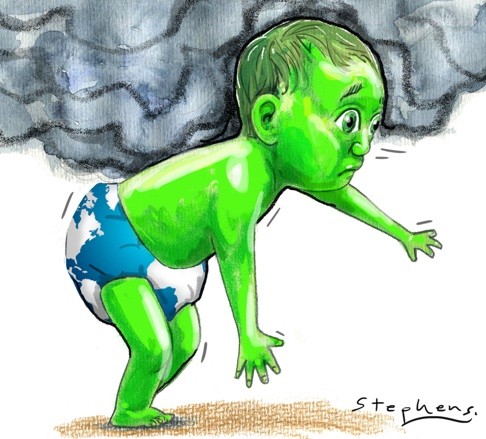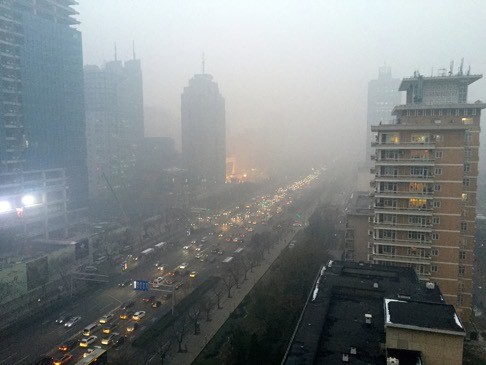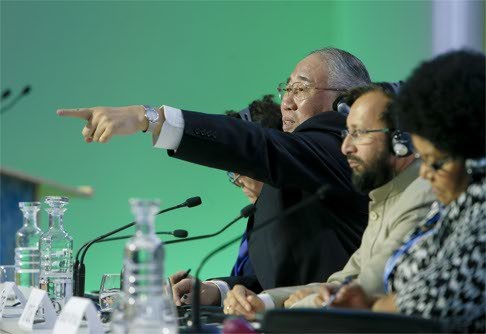
Who will nurture the fragile beginnings of a climate change agreement?
Kevin Rafferty says while hard-won, the Paris agreement by itself is likely to do little to slow or avert climate change. A serious commitment to promoting clean energy is needed

The media hyped words like “historic” and “game changer” to describe the agreement. Thousands of supporters in Paris did a Mexican victory wave to celebrate the end of fossil fuels and greenhouse gas emissions, or so they claimed.
READ MORE: Full coverage of the Paris climate change summit
It’s time for a reality check. The Paris deal will still see greenhouse gas emissions climbing to a peak in 2030, even if every country keeps its promises. At best, global temperatures will rise to 2.7 to 3 degrees above pre-industrial levels, far above 2 degrees, which scientists also say is the safety limit to prevent droughts, floods, rising seas and heat waves making life on earth unbearable.
What is needed is a multifocused effort to find new clean sources of energy that will allow up-and-coming countries to fulfil their dreams of pulling their people from poverty without making the earth uninhabitable
The Paris deal is not legally enforceable. It is an agreement, not a treaty. A treaty would have required US Senate approval, where Republicans would have scuppered it stillborn. It relies on the honour and honesty of each country to keep its promises to curb emissions.
Crucially, it omits to answer who will pay the US$100 billion a year to help poorer countries, both to assist heavy polluters to clean up their environment and to mitigate damage in the most vulnerable low-lying countries.
Paris is a defensive agreement that does not achieve what it sets out to do. What is needed is a multifocused effort to find new clean sources of energy that will allow up-and-coming countries to fulfil their dreams of pulling their people from poverty without making the earth uninhabitable.
The best that can be said is that a new green baby has been born. Forget the talk of a healthy toddler taking its first steps. This a newborn infant awkwardly delivered after 20 years of labour and constant argument.
To continue the baby metaphor, it has to be weaned, reared, clothed and educated by wilful progenitors who are still living unhealthy lifestyles. If this were a real baby, health and safety officials would snatch it from parents like heavily polluting China and India, the US, which denies the problem, and Japan, which encourages polluters to believe in the myth of “clean” greenhouse gas emissions.
READ MORE: China goes from back foot to big leap forward in negotiations

What is critical now is leadership from China, which played an important low-key role in reaching the deal and has been supportive without whooping claims of victory in the battle to save the earth. From US President Barack Obama came the claim that Paris is a “turning point for the world” and the “best chance” to save the planet, even as Republicans expressed their opposition to the new baby.
China’s chief negotiator, Xie Zhenhua (解振華), sounded a more cautious optimism: “The agreement is not perfect, and there are some areas in need of improvement.” He called the deal “fair and just, comprehensive and balanced, highly ambitious, enduring and effective.”
Smog alerts for Beijing throughout the two weeks of the Paris meeting may bring home to China just how much urgent work there is to do. Optimists say that President Xi Jinping (習近平) and his team are above all smart pragmatists who understand the science, the technology and the politics of the suffocating earth.
They are neither climate change deniers nor evangelistic converts to a green economy. China has the financial clout to be a playmaker and growing political and diplomatic influence worldwide to bring a new alliance of countries together against global warming.
READ MORE: How China has gone from climate villain to hero in just six years
Investors in Gates’ coalition plan to raise seed funding, angel funding and Series A investments across five key areas: electricity generation and storage, transportation, industrial uses, agriculture and energy efficiency. “The renewable technologies we have today, like wind and solar, have made a lot of progress and could be one path to a zero-carbon energy future,” Gates said in a statement. “But given the scale of the challenge, we need to be exploring many different paths, and that means we also need to invent new approaches.”

Bill McKibben, co-founder of 350.org, a climate advocacy group calling for carbon dioxide in the atmosphere levels to be reduced to 350 parts per million, from the current 400, believes the world is on track for a temperature rise of between 4 and 5 degrees above pre-industrial levels.
If Paris is to mean anything, someone has to take charge to encourage everyone to do better, to chide and shame the laggards and promote the best ideas
If governments want to get serious, he correctly says, they need to show more urgency and to declare some areas off limits, such as the Arctic, fracking, pre-salt formations off Brazil, oil off north America.
The first achievement of Paris is that a deal was done, unlike Copenhagen, which collapsed in acrimony, and other meetings over the past 20 years which offered little more than the hot air of argument. To get 196 different countries to agree together, from big polluters, rich and poor, to small island states that are the poorest victims of pollution, may count as the finest hour of President Francois Hollande and his foreign minister, Laurent Fabius.
Kumi Naidoo, executive director of Greenpeace International, said Paris was a first step: “Today, the human race has joined in a common cause ... The Paris agreement is only one step on a long road ... The deal alone won’t dig us out of the hole that we’re in, but it makes the sides less steep.”
Who is going to guide the steps of the green baby? An important feature of the deal is the built-in review every five years, starting with a “facilitative dialogue” in 2017, to update and assess promises in the light of experience and the real world.
If Paris is to mean anything, someone has to take charge to encourage everyone to do better, to chide and shame the laggards and promote the best ideas, to keep powerful Big Oil at bay and to see that green energy takes root.
But who? Is Xi big enough? It is hard to see another leader with stature and such a big stake in a green earth.
Kevin Rafferty, a journalist and commentator, wrote a briefing book for delegates to a previous environment conference

